Key takeaways:
- Evidence-based projects integrate research evidence, clinical expertise, and patient values, driving better healthcare decisions.
- Celebrating successes fosters motivation, reinforces positive behaviors, and encourages team bonding, enhancing collaborative growth.
- Involving the team in celebrations deepens connections and acknowledges individual contributions, boosting overall morale.
- Learning from past experiences and setting clear future goals, along with a flexible mindset, are vital for continuous improvement in projects.
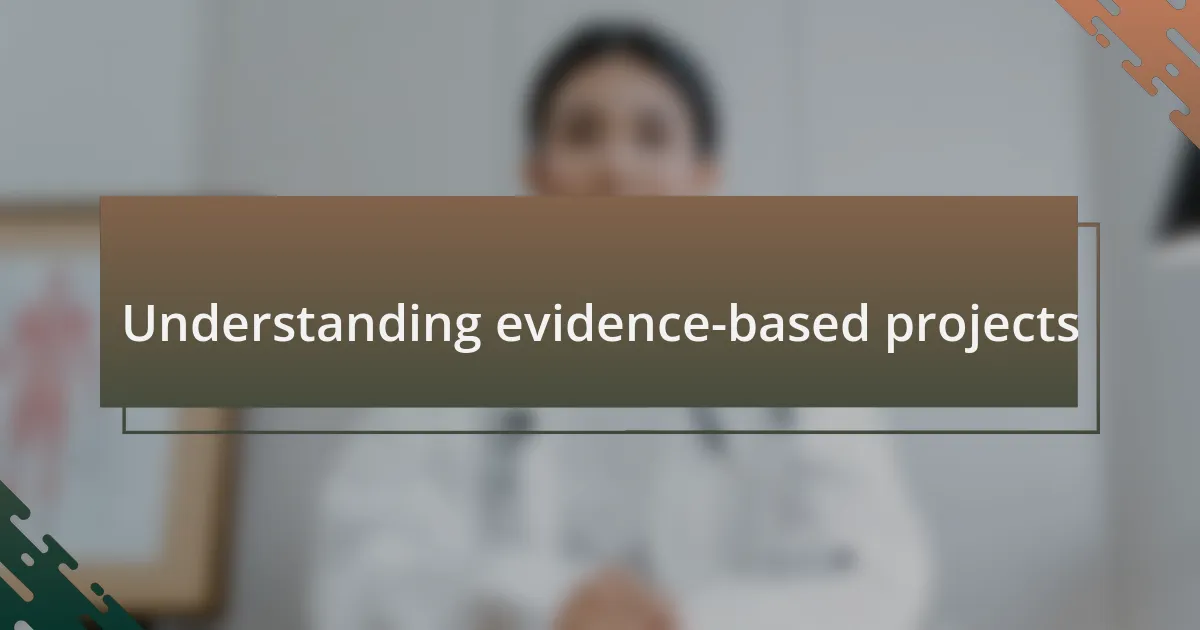
Understanding evidence-based projects
Evidence-based projects rely on the integration of the best available research evidence with clinical expertise and patient values. I remember when I first stumbled upon this concept; it felt like a revelation. The idea that decisions in healthcare could be so systematically grounded in evidence rather than just tradition or intuition was refreshing.
Consider this: how often do we rely on personal experience or hearsay in our daily practice? I’ve found that evidence-based projects challenge these assumptions. They drive us to look beyond our biases and make choices backed by solid data, ultimately benefiting patient outcomes.
However, it’s not just about the research; it’s also about collaboration and communication among various stakeholders in the medical field. Reflecting back on a project I led, I realized how vital it was to incorporate the insights from diverse team members, enriching the evidence with real-world experiences. This blend of research and firsthand accounts is what truly propels evidence-based projects forward.
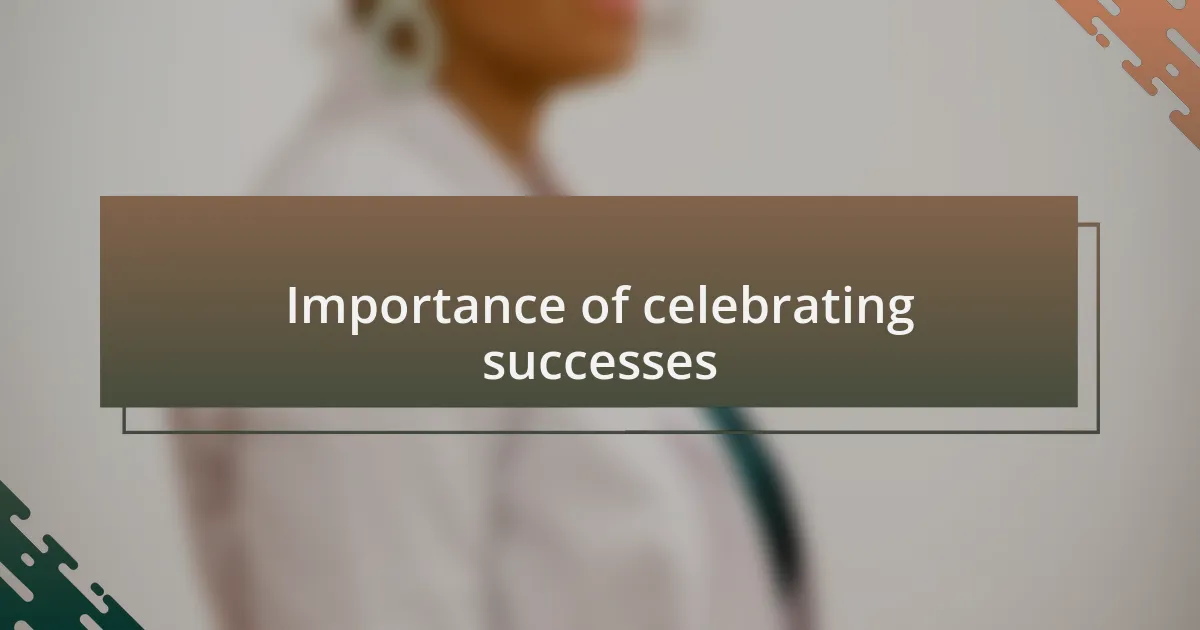
Importance of celebrating successes
Celebrating successes in evidence-based projects is crucial to fostering a culture of motivation and engagement among team members. I recall a specific moment in my career when a project I was part of achieved a significant milestone—sharing that success not only boosted morale but also deepened our camaraderie. It’s fascinating how a simple acknowledgment can create a ripple effect, inspiring others to strive for excellence as they see their efforts recognized.
When we take the time to celebrate, we reinforce the behaviors that led to those successes. For instance, in a recent project, recognizing the innovative approach of a colleague not only made them feel valued but also sparked new ideas among the rest of the team. Have you ever noticed how collective celebrations, even small ones, create a shared sense of purpose? These moments remind us that we are not just working in isolation; we’re part of something bigger.
Moreover, celebrating successes provides an opportunity for reflection and learning. After reaching a key milestone, I often find the team discussing what worked well and what could be improved for future projects. Isn’t it interesting how taking a moment to celebrate can set the stage for even greater achievements down the line? By embracing these successes, we lay a strong foundation for continuous improvement and collaborative growth.
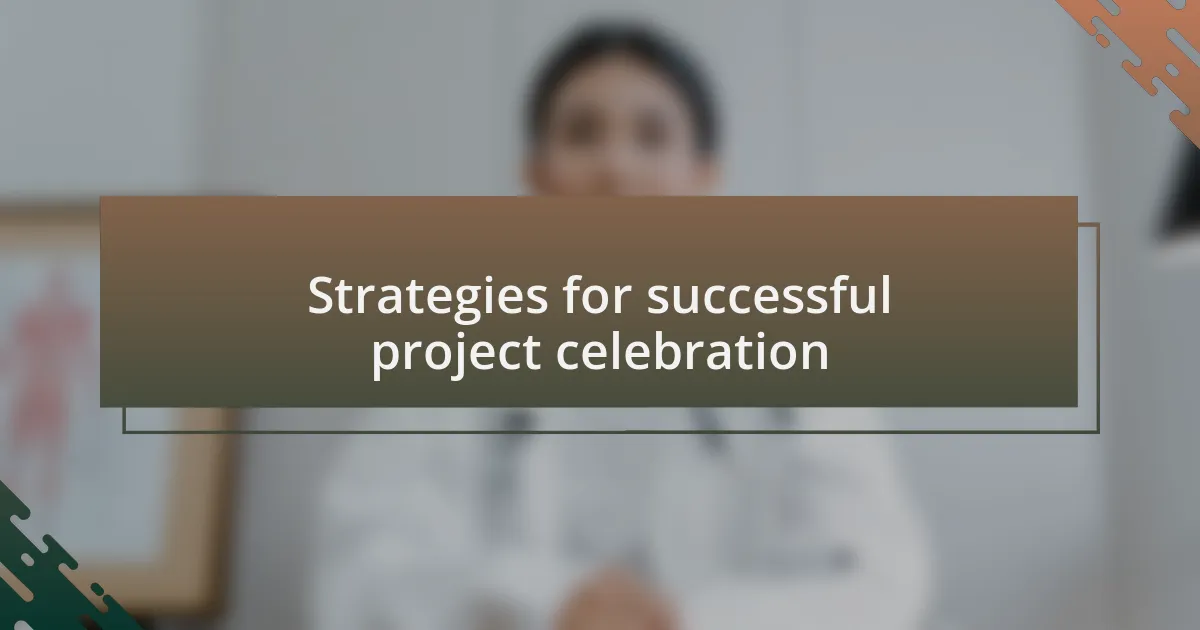
Strategies for successful project celebration
One effective strategy for celebrating project successes is to create a dedicated “success ceremony.” I vividly remember organizing a small gathering after a project wrapped up successfully; we presented awards and shared highlights. This not only acknowledged individual contributions but also transformed the atmosphere into one of shared triumph. Have you ever experienced that electric feeling when a team stands together in recognition of hard work?
Another fruitful approach is to incorporate storytelling into your celebrations. I’ve found that sharing the journey—the challenges faced and milestones achieved—can deepen connections among team members. By recounting our shared struggles and victories, we foster a stronger team identity. Don’t you find that moments of storytelling linger in our memories far longer than traditional accolades?
Lastly, think about integrating celebrations into regular project updates. I once suggested dedicating a portion of our meetings to highlight successes, no matter how small, in real time. This not only made achievements feel more immediate but also encouraged ongoing motivation. When we normalize the recognition of success, the whole team stays engaged and ready to tackle new challenges. Isn’t it remarkable how a little acknowledgment can transform the everyday grind into an inspiring journey?
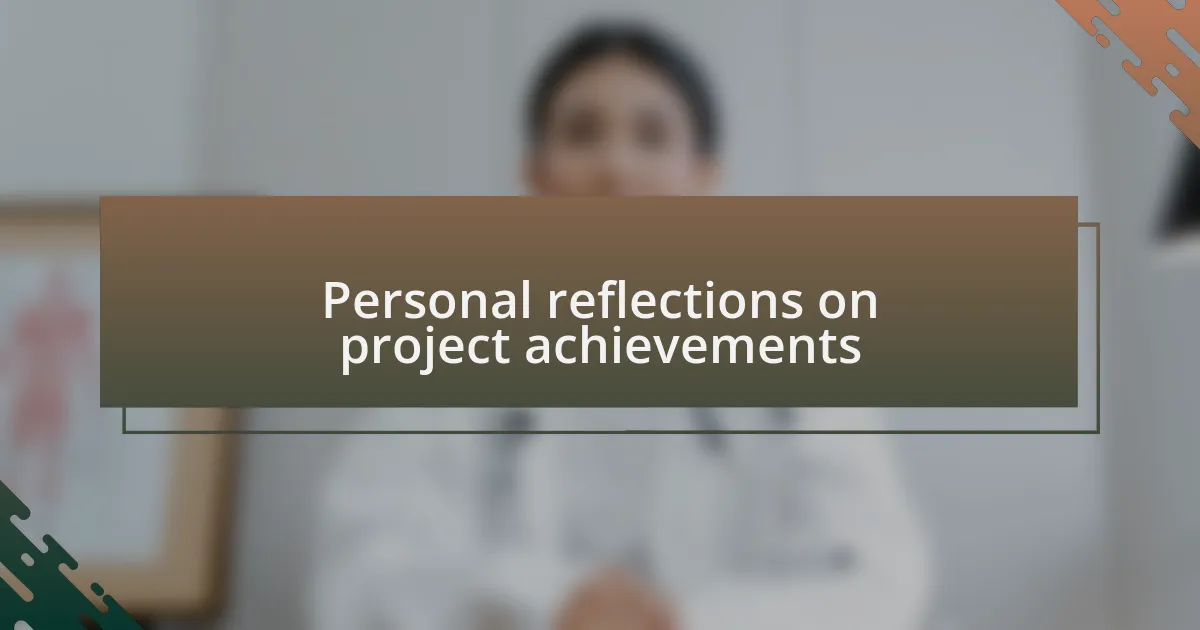
Personal reflections on project achievements
Reflecting on project achievements brings a sense of fulfillment that’s hard to quantify. I recall a time when our team completed a complex evidence-based project just ahead of schedule. The relief and excitement we felt were palpable, and I remember taking a moment to absorb that joy, realizing how much we had collectively grown through the process. Isn’t it interesting how these successes often mirror our personal growth as well?
Sometimes, I think back to the recognition we received for implementing a novel decision-support tool. The accolades weren’t just about the tool itself; they represented countless hours of brainstorming, testing, and refining. Sharing that moment with my colleagues made me appreciate not just the project’s impact on our practice but also the bonds we had developed along the way. When was the last time a project’s success made you feel connected to your team in such a profound way?
Looking back on these milestones, I often find myself inspired to keep pushing boundaries. There was a project where we overcame significant setbacks, and celebrating its completion reminded me that resilience is crucial in our field. Reflecting on these achievements motivates me to embrace future challenges with a renewed vigor. How do you fuel your drive for success after celebrating accomplishments?
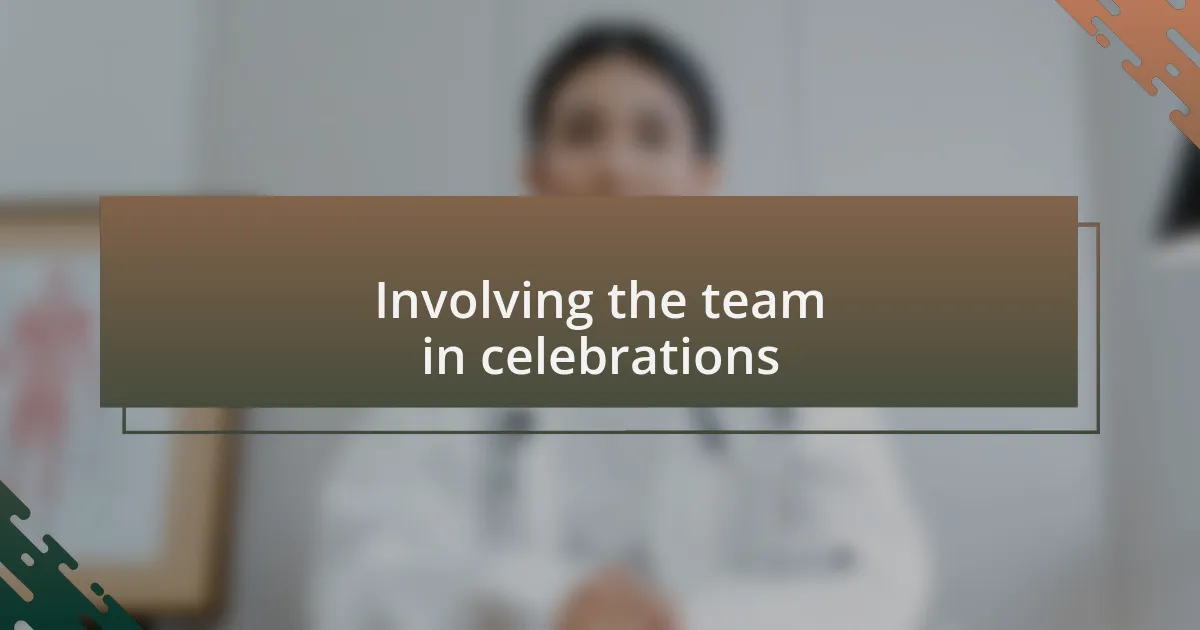
Involving the team in celebrations
Involving the team in celebrations is a crucial aspect of recognizing our achievements in evidence-based projects. I recall a project where we organized a small gathering to acknowledge our hard work. It wasn’t just about cake and speeches; it was a heartfelt celebration. Seeing my colleagues’ faces light up as they shared their favorite moments from the project reinforced the value of teamwork and collaboration.
I believe that celebrations can deepen our connections. During one particular instance, we created a fun awards ceremony, complete with quirky categories, like “Best Problem Solver” or “Most Creative Idea.” The laughter and playful banter that filled the room transformed our atmosphere, reminding everyone that while we aim for excellence, enjoying the journey is equally important. Have you ever considered how a shared laugh can create lasting camaraderie amongst team members?
By involving everyone in the success celebration, we affirm the unique contributions each person made. I remember participating in a team-building activity after completing a significant project milestone. Each member shared a personal takeaway from the experience. The profound insights and emotions conveyed left a lasting impression on me, illustrating that recognizing individual growth in a group success can elevate the entire team’s morale. How do you cultivate an environment where every voice feels valued during celebrations?
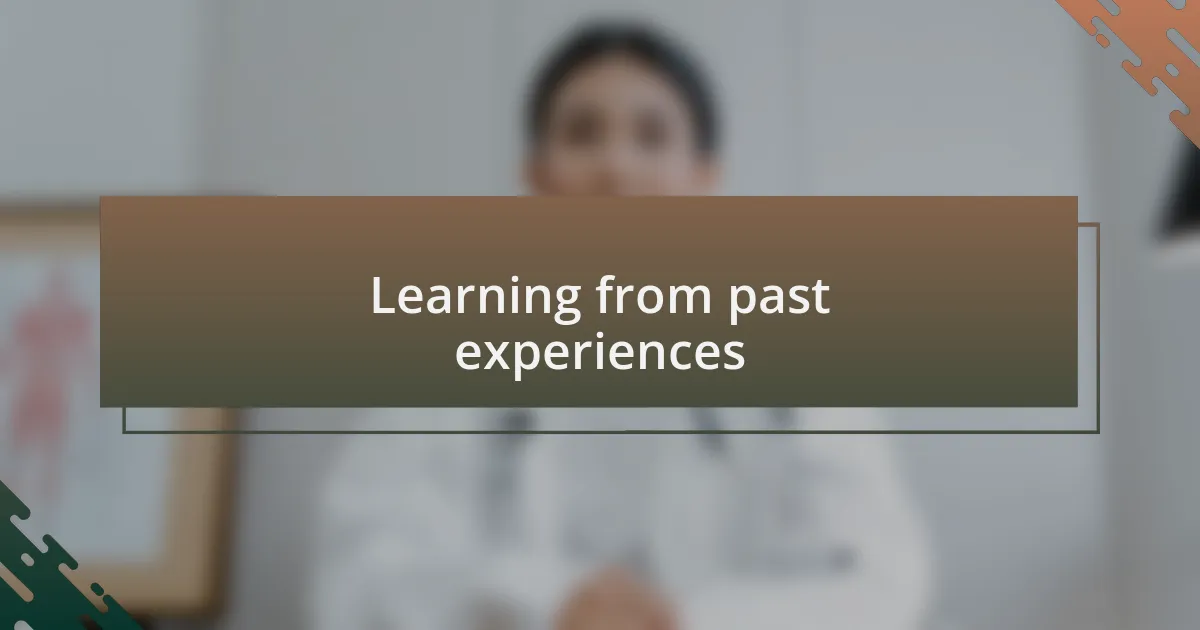
Learning from past experiences
Learning from past experiences is essential in refining our approach to evidence-based projects. I remember a time after a project didn’t meet its intended outcomes. Instead of pointing fingers, we held a reflective session to dissect what went wrong. This open dialogue not only uncovered essential insights but also fostered a culture of continuous improvement, emphasizing that failures can be stepping stones to greater successes. Have you ever faced a setback and found unexpected lessons within?
One of the most poignant lessons I’ve learned is the importance of documenting experiences. After completing a complex project, I initiated a shared document where team members could write down their reflections—what went well and what could be improved. Revisitings this document during subsequent projects proved invaluable; it provided our team with a roadmap of past successes and pitfalls. It made me realize that every experience, whether good or bad, carries wisdom. How do you capture and leverage your project experiences for future endeavors?
Taking the time to analyze our past experiences creates a dynamic learning environment. For instance, I once led a workshop where we mapped out previous challenges and our responses to them. The conversations that arose were enlightening, revealing patterns we hadn’t noticed before. Seeing team members eager to share their insights made me appreciate how collaborative reflection can unlock a wealth of knowledge. Have you engaged in such reflective practices within your projects?
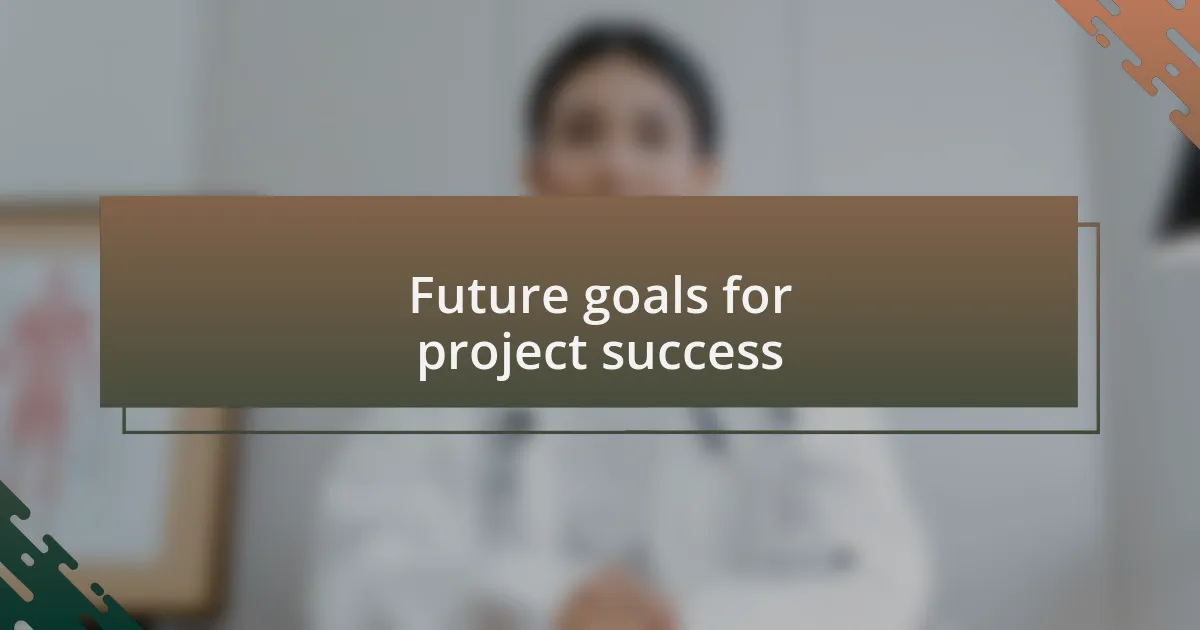
Future goals for project success
Setting clear future goals is vital for the success of our evidence-based projects. I remember a particularly ambitious initiative where we aimed to reduce patient wait times in our clinic. By establishing specific metrics—like a target reduction percentage—we transformed vague aspirations into actionable outcomes, paving the way for measurable success. How do you define your project’s goals to ensure clarity and direction?
Moreover, incorporating feedback loops into our future projects has become a priority for me. After completing a recent complex clinical trial, I realized that our outcomes could be far more impactful if we actively solicited feedback from all stakeholders. This input not only fosters a sense of ownership among team members but also helps us refine our objectives in real-time. Have you considered how ongoing feedback could shape the evolution of your projects?
Lastly, embracing a flexible mindset is essential as we plan for the future. In a past project aimed at implementing a new electronic health record system, we faced numerous unforeseen challenges that required us to adapt our original goals. By staying open to change, we discovered innovative solutions that exceeded our initial expectations. Do you allow your project goals to evolve with the circumstances you encounter?